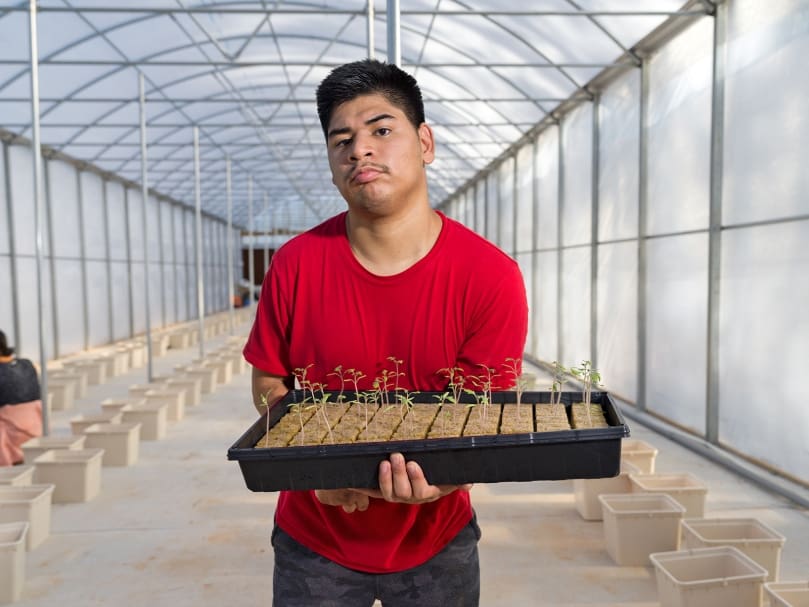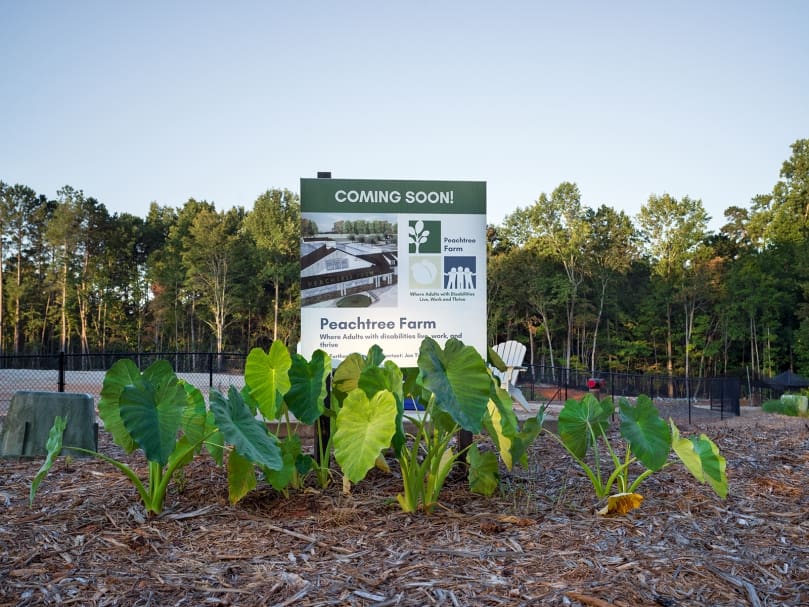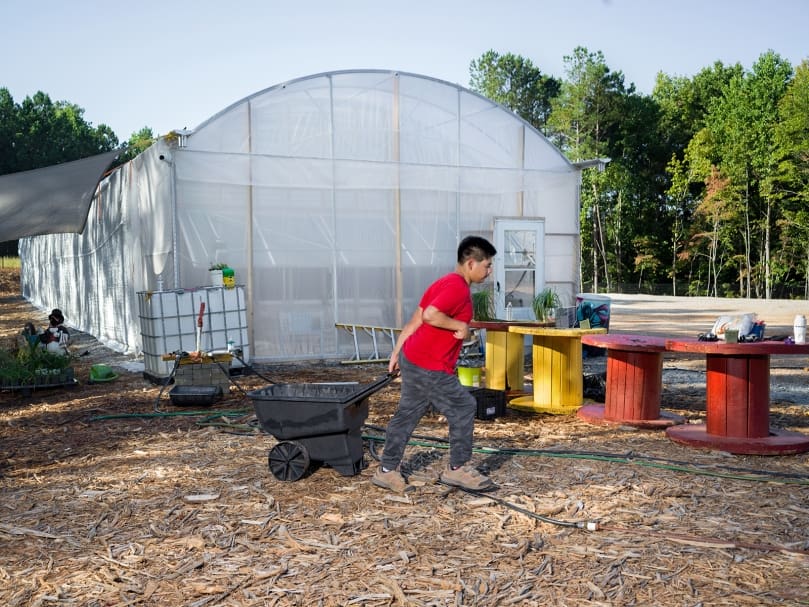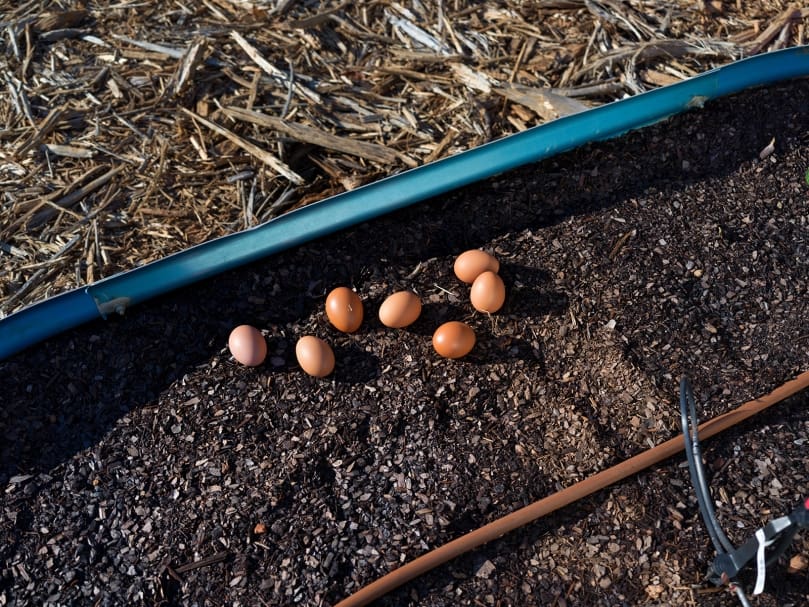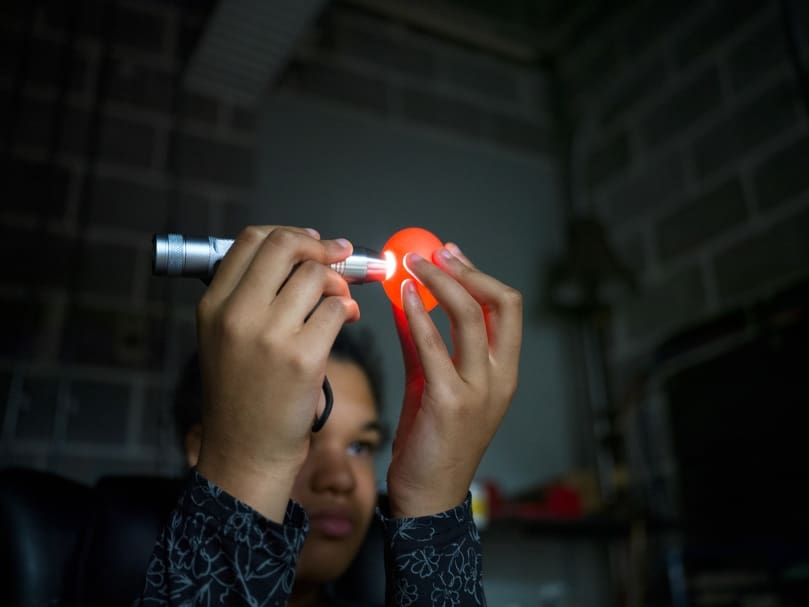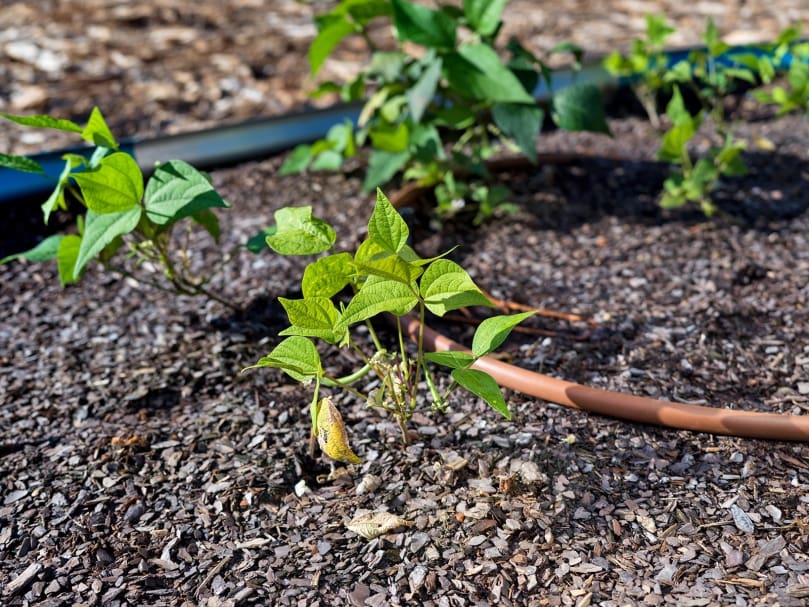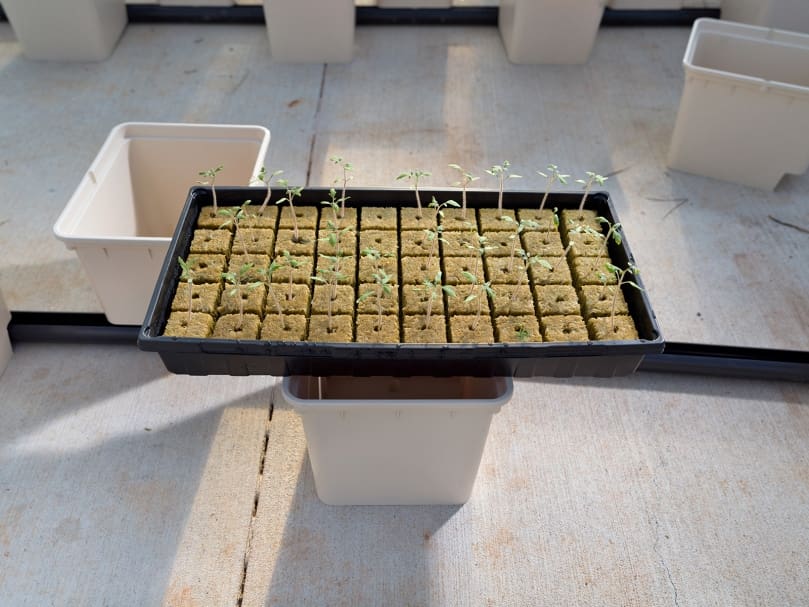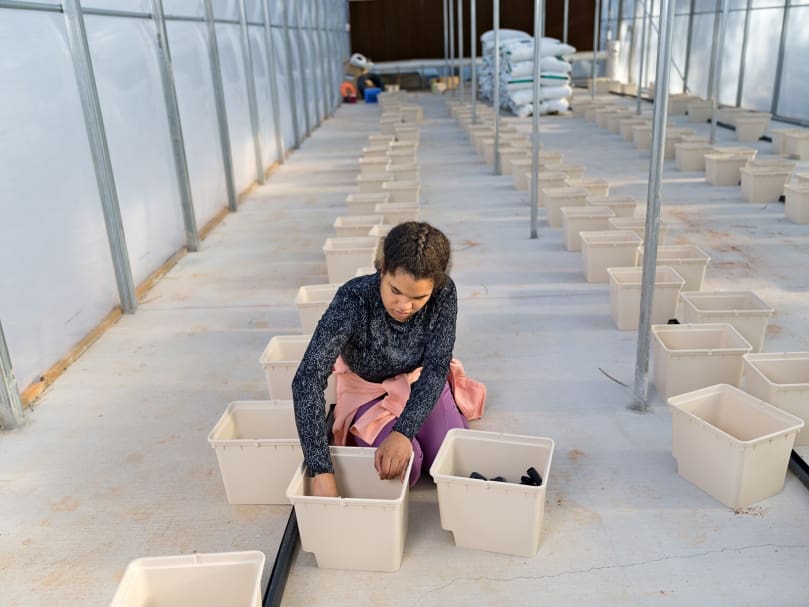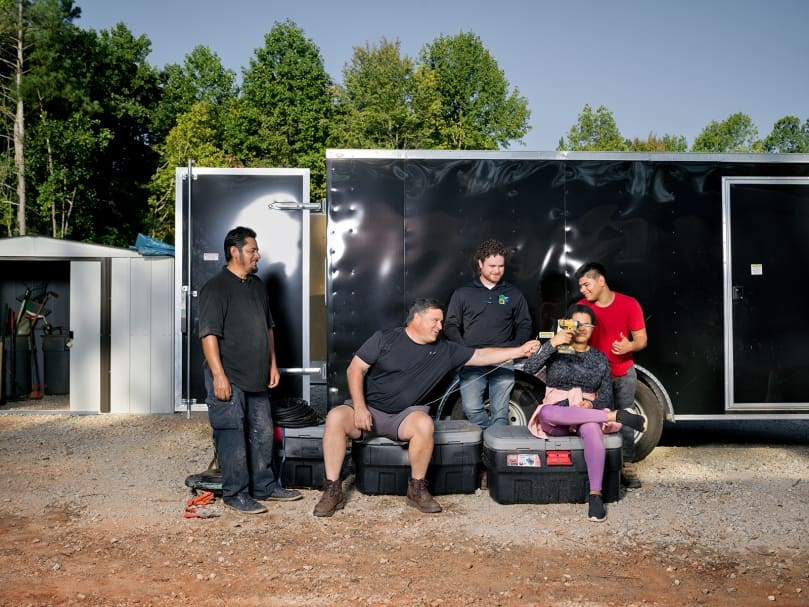Joseph Newton holds a tray of tomato seedlings inside the greenhouse at Peachtree Farm, which provides employment opportunities for men and women with disabilities. Photo by Johnathon Kelso
Peachtree Corners
New farm helps people with disabilities ‘to live, work and thrive’
By ANDREW NELSON, Staff Writer | Published September 29, 2022
PEACHTREE CORNERS—Behind a suburban office park, an innovative farm is growing fresh produce and raising animals while providing employment opportunities for women and men with disabilities.
Peachtree Farm already has a steady supply of eggs from its nine chickens. Honey bees should have hives in decorative bee boxes come spring. The hydroponic greenhouse’s rows of buckets will soon be home to tomato seedlings. A dozen raised beds hold spinach, radishes and broccoli for fall crops.
Joe Twiner, 26, is the executive director of the nonprofit Peachtree Farm. With a theology graduate degree from Boston College, Twiner does not have the pedigree of a farmer, but he has a passion for working with people with disabilities.
It’s a strong interest shared in the Twiner family. His father, Mike, served as president of the Georgia Special Olympics. His younger sister, Quinn, has special needs. The family also supports the Mustard Seed Communities for people with disabilities.
“Folks with disabilities want to be a part of our community, want to be engaged with other people, want to be engaged with other folks with disabilities, in particular, with that shared experience, but also with the broader community,” said Twiner.
A 2014 graduate of St. Pius X High School, Twiner wears scuffed brown work boots and a black shirt with the farm logo. He and his family worship at St. Jude the Apostle Church, Sandy Springs.
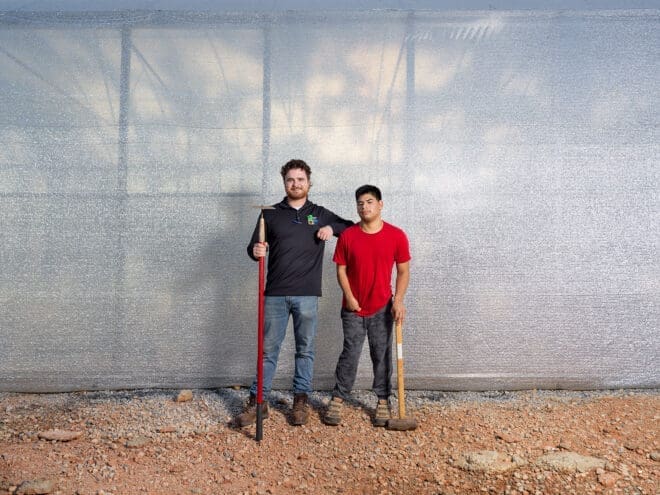
Peachtree Farm Executive Director Joe Twiner, left, and Joseph Newton, right, pose for a photograph outside the greenhouse at the farm. The nonprofit provides opportunities for adults with disabilities. Photo by Johnathon Kelso
The farm’s goal is to be a place where people have meaningful, paid jobs and learn skills that take them elsewhere. The program has so far employed nine farmers, in addition to some 20 high school students participating in vocational training. There is a waitlist for participants.
“We wanted to create something that would allow people to live, work and thrive,” Twiner said.
Sustainable jobs are hard to find for people with intellectual disabilities. A survey by the Special Olympics showed unemployment among working-age adults with intellectual disabilities is more than twice as high as for the general population. Less than half of the population is in the labor force.
The larger vision for the program is building a wrap-around community, employing about 50 people with disabilities to work on the farm, five large greenhouses and 15 supported living homes for about 45 people.
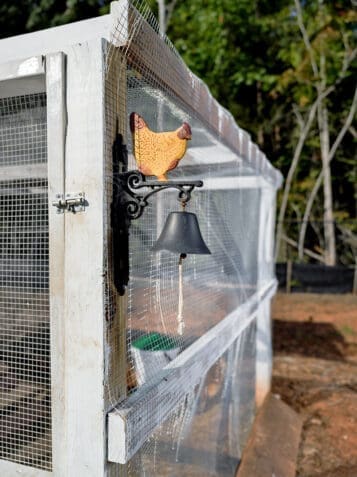
A bell hangs outside the chicken coop at Peachtree Farm. Photo by Johnathon Kelso
Maggie Rousseau, director of Disabilities Ministry at the Archdiocese of Atlanta, said the vision for the farm answers a tremendous need.
“Vocational rehabilitative programs exist to train persons with various job skills, but there is little opportunity to implement those skills. Additionally, transportation to and from work is often difficult to arrange. The vision of Peachtree Farm of incorporating meaningful training, work and community living is inspiring,” Rousseau wrote in an email.
Farming slows the pace
Farming engages people “because you can see the progress and it’s also not a product that you can speed up any quicker,” said Twiner. “No matter how much fertilizer you put on there, you can’t make it grow any quicker than it’s going to grow and so it allows us to focus less on efficiency and more on accessibility.”
Twiner found the Catholic Worker movement, started by Catholic activists Dorothy Day and Peter Maurin, inspiring with its emphasis on “return to the land.” He quoted Pope Francis’ environmental encyclical Laudato Si’ with its call for an “integral ecology” to understand how life, environment and society are interconnected.
The farm, along with its purpose, “sees disability as part of someone’s life that requires us to create a world of justice and create a world of equity,” he said. “Disability is more of a social structure than it is an individual impairment. All of that is what we’re called to do.”
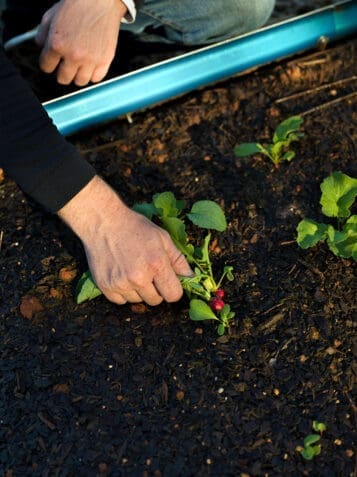
Executive Director Joe Twiner checks on radishes in a garden bed at Peachtree Farm. Photo by Johnathon Kelso
The year-old farm is the first part of the vision for the four-acre wooded property. In October, organizers will celebrate the completion of its first 3,000-square-foot commercial greenhouse dedicated to tomato growing. It allows the farm to grow and sell tomatoes year-round, to area restaurants and the public, along with seasonal vegetables, eggs and honey.
Community support helped the farm
The weekend farm stand has become one of the highlights of the program. Hundreds come out, giving the farmers the chance to sell to the community and the community supports its mission.
It’s celebrating its grand opening on Oct. 22 with its second “Tailgate for Tomatoes,” which includes a pumpkin patch, pumpkin chunkin, plant sales and more.
The nonprofit got help from construction experts at Brasfield & Gorrie, Henderson Electric and Vertical Earth to clear the land and establish the greenhouse. Volunteer support from the special needs community and family foundations helped during the first year to raise $250,000, said Twiner.
The chance to build the farm program from the ground up allows Twiner and supporters to craft its services and programs to match the needs of jobs and housing.
“We wanted to be able to address some of the needs we saw in our community,” said Twiner. “We don’t know if all of this will work exactly right for my sister, but we know that there’s a need for the community. We wanted to help address those needs.”
